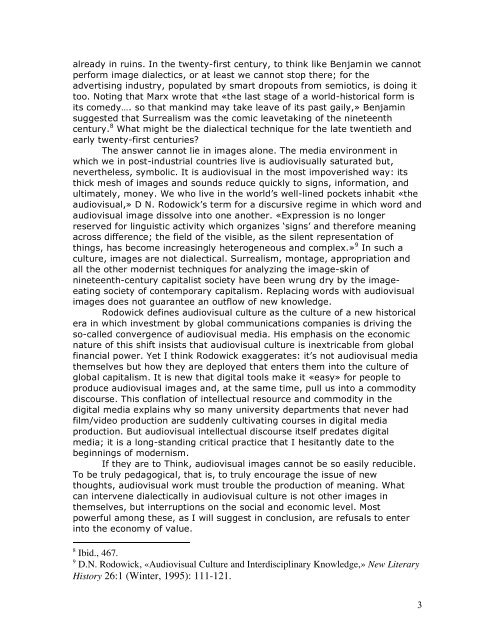Ibid. 56-58 Ibid. 63-67 1
0 1 Bill Readings, The University in Ruins (Cambridge, MA, and ...
0 1 Bill Readings, The University in Ruins (Cambridge, MA, and ...
- No tags were found...
Create successful ePaper yourself
Turn your PDF publications into a flip-book with our unique Google optimized e-Paper software.
already in ruins. In the twenty-first century, to think like Benjamin we cannot<br />
perform image dialectics, or at least we cannot stop there; for the<br />
advertising industry, populated by smart dropouts from semiotics, is doing it<br />
too. Noting that Marx wrote that «the last stage of a world-historical form is<br />
its comedy…. so that mankind may take leave of its past gaily,» Benjamin<br />
suggested that Surrealism was the comic leavetaking of the nineteenth<br />
century. 8 What might be the dialectical technique for the late twentieth and<br />
early twenty-first centuries?<br />
The answer cannot lie in images alone. The media environment in<br />
which we in post-industrial countries live is audiovisually saturated but,<br />
nevertheless, symbolic. It is audiovisual in the most impoverished way: its<br />
thick mesh of images and sounds reduce quickly to signs, information, and<br />
ultimately, money. We who live in the world’s well-lined pockets inhabit «the<br />
audiovisual,» D N. Rodowick’s term for a discursive regime in which word and<br />
audiovisual image dissolve into one another. «Expression is no longer<br />
reserved for linguistic activity which organizes ‘signs’ and therefore meaning<br />
across difference; the field of the visible, as the silent representation of<br />
things, has become increasingly heterogeneous and complex.» 9 In such a<br />
culture, images are not dialectical. Surrealism, montage, appropriation and<br />
all the other modernist techniques for analyzing the image-skin of<br />
nineteenth-century capitalist society have been wrung dry by the imageeating<br />
society of contemporary capitalism. Replacing words with audiovisual<br />
images does not guarantee an outflow of new knowledge.<br />
Rodowick defines audiovisual culture as the culture of a new historical<br />
era in which investment by global communications companies is driving the<br />
so-called convergence of audiovisual media. His emphasis on the economic<br />
nature of this shift insists that audiovisual culture is inextricable from global<br />
financial power. Yet I think Rodowick exaggerates: it’s not audiovisual media<br />
themselves but how they are deployed that enters them into the culture of<br />
global capitalism. It is new that digital tools make it «easy» for people to<br />
produce audiovisual images and, at the same time, pull us into a commodity<br />
discourse. This conflation of intellectual resource and commodity in the<br />
digital media explains why so many university departments that never had<br />
film/video production are suddenly cultivating courses in digital media<br />
production. But audiovisual intellectual discourse itself predates digital<br />
media; it is a long-standing critical practice that I hesitantly date to the<br />
beginnings of modernism.<br />
If they are to Think, audiovisual images cannot be so easily reducible.<br />
To be truly pedagogical, that is, to truly encourage the issue of new<br />
thoughts, audiovisual work must trouble the production of meaning. What<br />
can intervene dialectically in audiovisual culture is not other images in<br />
themselves, but interruptions on the social and economic level. Most<br />
powerful among these, as I will suggest in conclusion, are refusals to enter<br />
into the economy of value.<br />
8 <strong>Ibid</strong>., 4<strong>67</strong>.<br />
9 D.N. Rodowick, «Audiovisual Culture and Interdisciplinary Knowledge,» New Literary<br />
History 26:1 (Winter, 1995): 111-121.<br />
3


